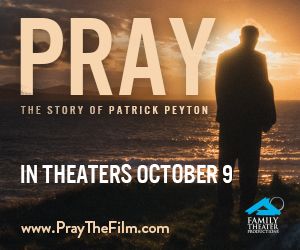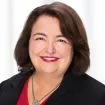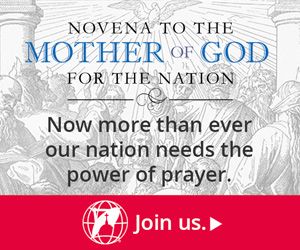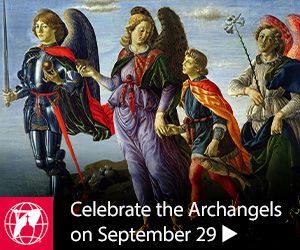WASHINGTON — Seventh Circuit Judge Amy Coney Barrett, 48, and 11th Circuit Judge Barbara, Lagoa, 52, both Catholic women, are reportedly President Donald Trump's top choices to fill the seat on the U.S. Supreme Court left vacant by the death of Justice Ruth Bader Ginsburg.
Barrett, a former Notre Dame Law School professor, emerged as a conservative icon after she was grilled about her faith-based views on abortion during her 2017 Senate confirmation hearing. Lagoa, by contrast, lacks a similarly compelling national profile, but the trailblazing Cuban American has served on state and federal courts for 14 years, and has the enthusiastic backing of Florida's GOP leadership.
Trump, who met with Barrett on Monday, will announce his final choice by Saturday. There are several other conservative female jurists on the list, as well.
At present, the White House is weighing Barrett's record as a both a top scholar and jurist, along with her ability to galvanize the conservative base, against Florida Republicans' broad support for Lagoa, in a key battleground state.
Judges Barrett and Lagoa "have really good records of adhering to the rule of law, and I support both of them," Carrie Severino, president of the Judicial Crisis Network and a veteran strategist of Supreme Court confirmation hearings, told the Register.
But the Heritage Foundation's John Malcolm was more circumspect.
"Nobody is saying anything bad about Judge Lagoa," Malcolm told the Register.
"People who are familiar with her like her a lot, but those I have spoken with would prefer Barrett. She is more of a known entity and has a more distinguished resume."
At Notre Dame Law School, where Barrett earned her law degree and taught as a full-time professor for 15 years, the jurist's many friends expressed enthusiastic support for her nomination, but also a measure of "anxiety."
"Folks out here are of two minds," said Carter Snead, a Notre Dame Law School professor and friend of Barrett's.

"There is no one more qualified to be on the Supreme Court in terms of her accomplishments, intellect, and integrity. That is a widely shared view at Notre Dame."
At the same time, "People are anxious, and they don't want their friend to go through a savage process. It is a politically fraught moment."
Barrett's Background
Born in Metairie, Louisiana, and a graduate of Catholic high school, Barrett received her undergraduate degree from Rhodes College, before heading to Notre Dame for law school on a full scholarship. After graduating first in her class in 1997, she won a Supreme Court clerkship with the late Justice Antonin Scalia.
She spent a few years in private practice, before she returned to Notre Dame to teach at the law school, and then became a full-time professor — earning the "distinguished professor of the year" award three times.
Barrett published widely in law journals and was a highly respected constitutional scholar well before Trump nominated her to the 7th Circuit, and her acrimonious 2017 Senate confirmation hearing earned her a wide national audience.
At the hearing, she was questioned about her past writings that explored how a Catholic jurist might handle legal cases that dealt with serious moral issues like abortion, capital punishment, and euthanasia.
The questions were prompted, in part, by a 1998 Marquette Law Review article, "Catholic Judges in Capital Cases," which she coauthored with John Garvey, a Notre Dame law professor who now serves as the president of The Catholic University of America. The article suggested that Catholic teachings regarding the immorality of capital punishment might constitute a reason for Catholic judges to disqualify themselves from hearing some death penalty cases.
But Barrett told the Senate Judiciary Committee that she did not believe it was "lawful for a judge to impose personal opinions, from whatever source they derive, upon the law," and she promised that her position on abortion "or any other question will have no bearing on the discharge of my duties as a judge."

Asked about whether she might recuse herself from ruling on cases where the law conflicted with Catholic moral teachings that guided her own beliefs, Barrett noted that she had "fully participated in advising Justice Scalia in capital cases as a law clerk."
But Feinstein pressed on, and insisted Barrett had a "long history of believing that religious beliefs should prevail."
Added Feinstein: "[T]he conclusion one draws is that the dogma lives loudly within you. And that's of concern when you come to big issues that large numbers of people have fought for years in this country."
Charismatic Community Participation
As the Senate was preparing to vote on Barrett's confirmation, her participation in a "charismatic Christian community" called People of Praise drew additional scrutiny, with a New York Times article raising questions about whether she would be unduly influenced by the group's adherence to biblical teachings on marriage and related matters.
This week, Newsweek tapped into that argument, publishing a story reporting an unsubstantiated claim that Barrett was "affiliated with a type of Christian religious group that served as inspiration for Margaret Atwood's dystopian novel, The Handmaid's Tale," which was published in 1985 and later adapted into a popular television production. The Newsweek article misleadingly stated that "People of Praise inspired The Handmaid's Tale," before issuing a clarification, noting that the book's author "has never specifically mentioned the group as being the inspiration for her work."
People of Praise was founded with the support of the late Cardinal Francis George, and Church leaders affiliated with the group have pushed back against the characterization of People of Praise as a fringe "cult."
"We're a lay movement in the Church," Bishop Peter Smith, an auxiliary bishop of the Diocese of Portland, Oregon, told Catholic News Agency in 2018.
Notre Dame's Carter Snead, who is not a member of People of Praise, underscored this point.
"If you spend any time with 'People of Praise' you meet kind people who love their neighbor and take care of others, he said. "It is a lay renewal movement."
Barrett's Approach
Snead also addressed efforts to frame Barrett as a jurist whose rulings would be guided by her faith rather than constitutional principles.
In a speech before Notre Dame law students, Barrett had reflected on the practice of the law as a form of Christian vocation, and her critics have pointed to her words as further evidence of the disturbing influence of her faith on her professional duties.
But Snead explained that her remarks affirmed Notre Dame Law School's own mission.
"The role of being a lawyer is bound up in serving a cause greater than ourselves," he said.
"It is actually to serve others through the mechanism of the law, to be a faithful servant of the law.
"But religion is so foreign to many of our friends in the secular media" that they misinterpret her words.
Then he took the opportunity to single out Barrett's many striking personal qualities.
"She is a wonderful teacher, mentor, and mom, with seven children," including two adopted children from Haiti and a child with Down syndrome, he said.
"She has boundless energy and seeks out others for help and support. It is a self-emptying kind of generosity and charity."
Barrett's friends hope that the confirmation hearings will spotlight her sterling character, but Senate Democrats are expected to focus on the threat Barrett poses to Roe v. Wade.
While Barrett has not ruled on abortion since her 2017 confirmation hearings she has weighed in on two abortion cases, both by supporting appeals for the full bench to rehear a case.
In one such case, flagged by Scotusblog, Barrett "indicated that she wanted the full 7th Circuit to hear a challenge to an Indiana law requiring young women to notify their parents before obtaining an abortion after a three-judge panel ruled that the law was unconstitutional."
Lagoa's Credentials
As the White House reviews its options for the high court, Trump's advisors will consider how that chamber will likely respond to each potential nominee: Barrett was confirmed for the 7th Circuit on a 54-42 vote, while the 80-15 vote in favor of Barbara Lagoa showed much stronger bipartisan support.
"Some have said Lagoa is a 'dark horse,' but she began serving on Florida's Third District Court of Appeal in 2006, and then the Florida Supreme Court, before Trump appointed her to the 11th Circuit," said Severino.
The child of Cuban immigrants, Lagoa has consistently been a strong defender of judicial restraint and the rule of law, say her supporters. A defining moment for her early career as a lawyer was her tireless pro bono work for the family of Elian Gonzalez, the Cuban boy who was rescued at sea in 1999 after his mother died fleeing her homeland.
Elian's maternal relatives wanted the child to remain with them in Miami, and sought to convince the federal government to allow them to apply for asylum on his behalf. But the U.S. government sided with the boy's father and the Castro government that sought his return to Cuba. In the end, federal agents forcibly removed the boy from his relatives' home and he was returned to his father.
As Cuban Americans, "we were all raised with the idea that the U.S. was there to protect people ... from the clutches of communism, and were collectively stunned" by Washington's handling of the case, said Raquel Rodriguez, former general counsel to Florida Governor Jeb Bush who has known Lagoa since the judge's law school days.
Lagoa is "friendly, very forthright, a fantastic listener, and very sharp — she can hold her own in any circumstance," said Rodriguez, who was present when Lagoa was interviewed for her first judgeship.
Rodriguez said the judge, a mother of three, was a "practicing Catholic; her family lives the faith."
A graduate of Catholic elementary and high schools, Lagoa received an undergraduate degree from Florida International University, and a law degree from Columbia University, where she was an associate editor of the law review, in 1992.
As a newly minted lawyer, Lagoa worked as a business litigator until she became an assistant U.S. attorney in 2002. At first, she handled civil cases, and then transferred to the criminal division.
Few Hot-Button Decisions
Lagoa has written hundreds of opinions as a sitting judge. But legal experts contacted by the Register acknowledged that her record on hot-button social issues is thin, and they could only point to a handful of relatively narrow rulings dealing with religious freedom issues.
"In the few religious liberty cases that have come before her she has typically been reluctant to entangle the courts in review of cases that turn in significant part on religious doctrine," Teresa Collett, a professor at the University of St. Thomas Law School, told the Register.
"During her confirmation for the 11th Circuit, Judge Lagoa was questioned about her vote in a case in which a priest accused the diocese of defaming him in an exchange over whether the priest was entitled to be promoted," said Collett. "She supported the ruling by the Florida intermediate Court of Appeals that abstained from inquiring into the diocesan staffing decision," thus respecting the right of the Church to make such determinations.
Meanwhile, news outlets have reported that Lagoa, along with her husband and fellow lawyer, Paul Huck, Jr., is a member of the conservative Federalist Society.
"Judge Lagoa is committed to applying the text of the law, and not legislating from the bench," said Rodriguez. "She respects the separation of powers, she will not substitute her judgment for the Congress or the president — whatever is the issue. She will be faithful to the Constitution."
Likewise, Congressman Matt Gaetz, R-Fla., a chief supporter, told The Washington Post this week that the judge was "reliably pro-life," and her "faith guides her perspective on life."
Democratic Party Criticisms
If Trump nominates Lagoa, Democrats have signaled several lines of attack. They have raised questions about her participation in a Federalist Society gathering, and have targeted her recent votes in two separate but related cases that dealt with a state referendum allowing the right to vote for felons who completed their sentencing.
"[I]n Jones v. Florida, Barbara Lagoa joined the Eleventh Circuit majority to hold that despite the passage of a state referendum restoring the right to vote to disenfranchised former felons, the state legislature could prevent otherwise eligible Floridians from voting if they did not pay all courts fines and fees (even if the state is unable to even tell the Floridian how much they owe)," charged Alliance for Justice, a progressive advocacy group, in a statement registering its opposition to her nomination.
But Rodriguez is convinced that if Trump chooses Lagoa, she will survive the Senate confirmation process with flying colors.
"She is a lifelong trial lawyer," said Rodriguez, "and that alone prepares you for the gauntlet."
The content of this article is intended to provide a general guide to the subject matter. Specialist advice should be sought about your specific circumstances.



